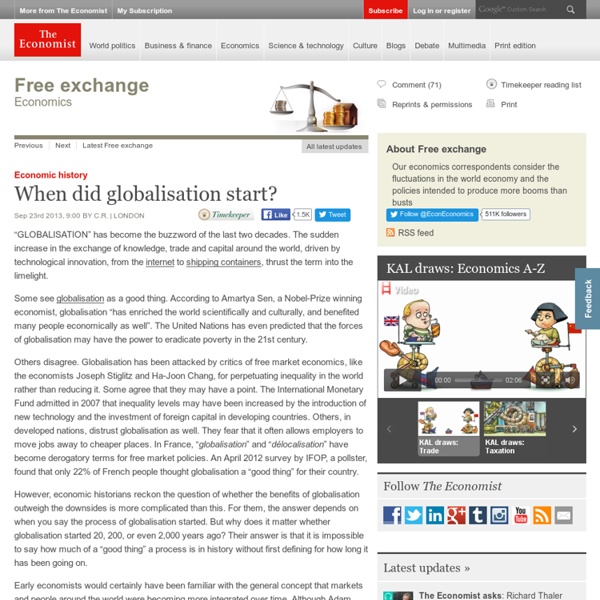When did globalisation start?

Topic 7: Globalisation Then and Now Key Dates | Raphael Conners
Topic 7: Globalisation Then and Now Key Dates: First wave: 19 th Century to Early 20 Century before World War I (From 1820 to 1913) Globalisation Backlash: 1930s Interwar Period, Start of World War I to End of World War II (1913-1950) Bretton-Woods Era (Period of Fixed Exchange and restriction on capital flows) 1950s to 1960s Second Wave: 20 Century to Early 21 st Century(After World War II) Other Possible Questions (other than those addressed, although points can be used as well) Differences in goods market liberalisation and capital account liberalisation (how they reduced trade costs -> globalisation -> goods & capital market integration) 1) Differences in Globalisation between 19 Century and 20 Century / Why might it be argued that globalisation began in the 19 Century? (i) Century (Key Driving Force: Reduced transport and communications cost brought along by technological improvements) European countries totally dominant. Composition of world merchandise trade in 1913: Primaries 64%; Manufactures 36%
Cashmere trade threat to snow leopards
23 July 2013Last updated at 13:46 GMT By Melissa Hogenboom Science reporter, BBC News Snow leopards are critically endangered as their natural prey has declined The global demand for cashmere is threatening endangered snow leopards, according to a new report. Domestic cashmere goats in parts of Central Asia have almost tripled in the last 20 years to fuel cashmere demand. The goats are encroaching on the natural habitats of the snow leopard and their natural prey. The authors of the paper, published in Conservation Biology, say that other endangered animals are also at risk. These include herbivores which compete for the same resources as the goats, such as the antelope Saiga tatarica, the Tibetan chiru (Pantholops hodgsonii) and the Himalayan bharal (Pseudois nayaur) also known as the blue sheep. As the snow leopards' habitats converge with domestic goats, the decline of wild prey can increasingly lead the leopards to hunt the goats. Continue reading the main story Mountain killer
Why is globalisation under attack?
Image copyright Getty Images Free trade and globalisation seem to be under siege from a broad and loud range of opponents. For decades there has been a strong consensus that globalisation brought more jobs, higher wages and lower prices - not just for richer countries but also for developing and poorer nations. But many people, including politicians, are now voicing their anger as they see jobs being taken by machines, old industries disappearing and waves of migration disturbing the established order. You don't have to look far to see the effect of those concerns in recent events. Globalisation: Where on the elephant are you? The Brexit referendum was dominated by concerns over immigration, the rise of Donald Trump has brought back the rhetoric of protectionismin the US and there have been mass protests in Europe over prospective international trade deals. What is behind this backlash and what can be done to address this crisis of globalisation? 'Free trade is stupid trade' Getty Images
Related:
Related:



